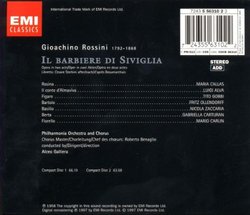| All Artists: Gioachino Rossini, Alceo Galliera, Maria Callas, Luigi Alva, Philharmonia Orchestra and Chorus, Gabriella Carturan, Tito Gobbi, Fritz Ollendorf, Mario Carlin Title: Rossini: The Barber Of Seville with Maria Callas, Tito Gobbi, Alceo Galliera, Philharmonia Orchestra & Chorus Members Wishing: 0 Total Copies: 1 Label: EMI Classics Release Date: 8/19/1997 Genre: Classical Styles: Opera & Classical Vocal, Historical Periods, Modern, 20th, & 21st Century Number of Discs: 2 SwapaCD Credits: 2 UPCs: 724355631022, 724355631053 |
Search - Gioachino Rossini, Alceo Galliera, Maria Callas :: Rossini: The Barber Of Seville with Maria Callas, Tito Gobbi, Alceo Galliera, Philharmonia Orchestra & Chorus
 | Gioachino Rossini, Alceo Galliera, Maria Callas Rossini: The Barber Of Seville with Maria Callas, Tito Gobbi, Alceo Galliera, Philharmonia Orchestra & Chorus Genre: Classical
Maria Callas surprised some fans when this recording appeared in 1958 by singing some of Rosina's music in the mezzo-soprano range. Originally used by Rossini, the mezzo range helped Callas in characterizing Rosina not as ... more » ![header=[] body=[This CD is available to be requested as disc only.]](/images/attributes/disc.png?v=15401716) ![header=[] body=[This CD is available to be requested with the disc and back insert.]](/images/attributes/disc_back.png?v=15401716) ![header=[] body=[This CD is available to be requested with the disc and front insert.]](/images/attributes/disc_front.png?v=15401716) ![header=[] body=[This CD is available to be requested with the disc, front and back inserts.]](/images/attributes/disc_front_back.png?v=15401716) |
Larger Image |
CD DetailsSynopsis
Amazon.com essential recording Maria Callas surprised some fans when this recording appeared in 1958 by singing some of Rosina's music in the mezzo-soprano range. Originally used by Rossini, the mezzo range helped Callas in characterizing Rosina not as a bird-brained, twittering, helpless ingenue but as a crafty, intelligent woman, smarter than any of the men around her (even the resourceful Figaro). Callas's Rosina knew exactly what she wanted and how she would get it. It is a brilliant performance, made even more enjoyable by the first-class contributions of Tito Gobbi, Luigi Alva, and Alceo Galliera. --Joe McLellan Similar CDs
|
CD ReviewsGreat performances & excellent ADD Stereo sound for 1958 Spiff | Europe | 09/21/2001 (5 out of 5 stars) "Callas sung this after her 5 unhappy performances at the La Scala. Her Rosina was described by critics to have "excessive nervous energy and unsuitable vocal color". Today, I've still seen a surprising number of comments stating that this was far from Callas' best performance. But I don't agree at all! At the centre of the performance is the combination of Gobbi and Callas. They're delightful. Galliera was a fortunate choice, the orchestra excels. Zaccaria is a very good Basilio. Fritz Ollendorff is not my favorite Bartolo, he lacks a bit of that evil comic villainy I've seen in others, but in any case, his performance is still excellent and others might find it perfect. The young Luigi Alva was also brilliant, and was probably very helped by his great performance in this recording.This version of Il Barbiere was one of the factors that ignited my interest in opera to levels I never expected before. The others were perhaps a few excellent live performances I had the privilege to hear. That's why I recommend this version to my opera-hating friends now, together with some tickets to a good live opera; Great libretto, wonderful music, a riotous romantic comedy, funny, fast action, top quality performances - Not bad for a start.Most people I know consider "Una voce poco fa" Callas greatest moment in this opera; They might be right, but to my ears, Callas excels in her second duet with Gobbi: "Dunque io son" remains one of my favourite all time duets in opera buffa. You can find Calla's sweet and innocent Rosina at her most here. Incredibly satisfying. Gobbi and Callas are amazing in these 5 minutes. Bliss! I remember hitting "previous track" quite a few times on the player when I first heard it. Couldn't get enough. Well, still can't. :-)Finally, a small note to those who are worried about the almost 50 years old ADD recording: Fear not! Yes, this was recorded in studio in 1958, while stereo technology was still fairly new, but the sound quality is surprisingly good. I am rather picky with audio quality and sometimes regret not being able to fully enjoy some of the old classics, I just can't fully appreciate the music if the sound quality isn't a good challenge to my ears and equipment. This version was obviously well recorded back in 58 and EMI's remastering in 1997 improved it. Stereo separation is excellent, soundstage is wide. Obviously, don't expect it to match today's cutting edge sound engineering, but vocals are very clear and well defined.. I can only complain of the usual tape hiss (quite subtle in this case) and the usual overload clipping in a few more intense areas, but those are never too irritating (even with headphones). I've often seen many modern ADD and even DDD recordings put to shame by this quality. Not the only good Barbiere I've heard, but definitely my favourite so far. Get it, chances are you won't regret it at all. Ever." Pure fun! Ivy Lin | Ithaca, NY | 05/09/2001 (5 out of 5 stars) "I admit to being very skeptical of this recording. I couldn't picture Callas, the queen of Grand Noble Heroines, in a comedy. But I'm very happy to say I was oh-so-wrong. This recording is pure fun and energy from start to finish.Callas is delightful here, as is the rest of the cast. Today this role is usually taken by a mezzo-soprano, but Callas sounds very mezzo-like and uses much of the mezzo score. I really can't believe her voice would be shot within a year -- here she sounds amazingly young, fresh and agile. She shows off a lot -- high notes (she holds the high B of "Una voce poco fa" until you're afraid her lungs will burst), trills, ornamentations, but that's part of the fun. She tosses in high notes here and there too, just to remind people that she can. Her Rosina is equal parts "dolce, amorosa" and "vipera." I never knew Tito Gobbi could sound so lighthearted. I particularly love the way he sings his recitatives -- hilarious. Luigi Alva makes his Count slightly silly-sounding, which is very funny, particularly when he pretends to be the music teacher. Galliera leads the Philharmonia orchestra in a spirited, lighthearted rendtion of the score.This recording is just too fun to pass up. Occasionally, you need to hear an opera where people don't die. Some caveats: there are the traditional cuts, and sound is early stereo, so sometimes the balance isn't quite right between orchestra and voices -- you know its not balanced when you have a hard time hearing Gobbi and Callas! But try this -- you'll like it!" Signore e signori, Il Barbiere! Bogdan Iliescu | Houston, TX USA | 07/15/2004 (5 out of 5 stars) "What a recording this is! Witty, funny, grabs you, puts you in the middle of the action and doesn't let you go all the way to the end. You will find yourself cheering happily when it is over and you will think that these are the actual characters coming all the way from Seville to sing for you.Everybody is in excellent shape but the real difference is made by the unity and the flawless unfolding of the intrigue. Every single role is convincing and consistent throughout the opera, the orchestra plays beautifully and supports with such energy and humour the voices. Callas is in perfect mood and in excellent voice. Her Rossina is the best available. Listen to "Una voce pocco fa" and be amazed by all the nuances you can find there. Mr. Gobbi is again the voice and the actor in one of his best recorded performances. I must agree with one of the reviewers in saying that his Figaro is the best on disc. He displays too a very beautiful voice and an amazing characterization of Figaro. Their duet in the first act is a glorious moment of recorded opera. They tell so much besides what their words are actually communicating. The rest of the cast comes nearly as equals and everybody seemed to understand the in the same way what this opera is about and what each and all of them have to say in it.All in all it is a great recording. Great music making, solid and expressive characters, good and entertaining drama, good loughs everything the Barbiere should be in my opinion."
|

 Track Listings (21) - Disc #1
Track Listings (21) - Disc #1
